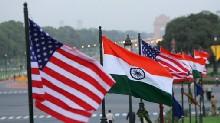US has appealed to India to work with it in other parts of the world, just not only in South Asia. "We are counting on India's rise not just as an economic partner but as a global power one that engages everywhere from Latin America to the Middle East to East Asia," Deputy Secretary of State William J Burns said in his remarks on 'Is there a future for the US-India partnership?', organised jointly by the FICCI and Brookings Institute, a Washington-based eminent American think tank.
"We are counting on India's rise not just as an economic partner but as a global power one that engages everywhere from Latin America to the Middle East to East Asia," Deputy Secretary of State William J Burns said in his remarks on 'Is there a future for the US-India partnership?', organised jointly by the FICCI and Brookings Institute, a Washington-based eminent American think tank.
India's leadership in promoting a more stable South Asia its multibillion dollar assistance commitment to Afghanistan, its determination to re-engage and normalise trade with Pakistan, and its joint projects to boost infrastructure and capacity in Bangladesh, Nepal, Sri Lanka and the Maldives offer the hope of a more peaceful future for the region and the world, he said.
For US and Indian policymakers, a successful transition in Afghanistan is a shared imperative and an area of increasing cooperation.
"As the United States draws down our forces and transfers responsibility for security to the Afghan people, we are ever mindful of Afghanistan's recent history and the terrible costs of neglect."
None of us can afford to make that mistake again," he noted. "Success in Afghanistan depends on ensuring that others are there, too. That certainly includes India.
With coalition forces drawing down, Afghanistan will need extensive private investment and economic linkages with its neighbours," he said.
Even with no direct access to India's rising middle class market, Afghanistan already sends one-quarter of its exports to the country, he said, adding that imagine what will be possible when transit and trade agreements extend outward to India and Central Asia, and Afghan traders are able to shift goods directly to the markets of Mysore and Mumbai.
The US and
"It is precisely for this reason that the US and India decided to launch a strategic dialogue on the Asia-Pacific in 2010."
Since then, this mechanism has emerged as a model for the type of engagement and dialogue that we need to identify new areas of cooperation and to pursue complementary strategies," he said.
Burns said India has built a vast network of bilateral economic cooperation agreements and security arrangements in the Asia-Pacific with traditional American allies like Japan, South Korea, and Australia, and with its other partners, like Singapore, Indonesia and Vietnam.
"We are launching a new US-India-Japan trilateral consultation on regional issues. India's outreach is growing, moving toward a comprehensive vision for the East Asia region a 'Look East' policy that is becoming an 'Act East' policy," he said.
Burns hoped that India will join the US in working to strengthen Asia's many regional institutions.
"Prime Minister (Manmohan) Singh's appearance alongside President Obama at the East Asia Summit in November will help that grouping become the premier forum for our leaders to discuss political and security issues in Asia," he said.
The official said the 21st century Asia-Pacific the Obama Administration seeks is one in which India, US and China all enjoy good relations.
"Whatever our differences, we know that, as this century advances, fewer and fewer global problems will be solvable without constructive cooperation among our three great countries."
To paraphrase India's National Security Advisor, I have no doubt that Asia and the world is big enough for the three of us, if we want them to be. We will all benefit from enhanced collaboration in the years ahead," he said.










